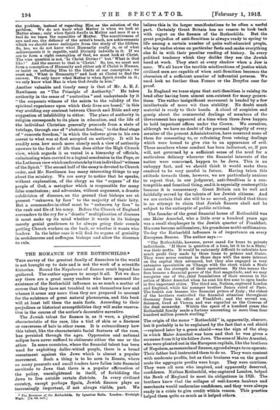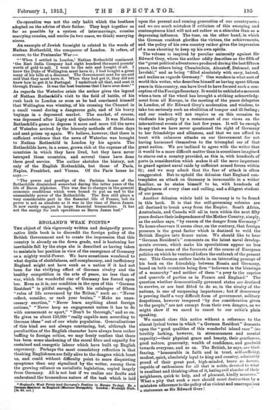THE ROMANCE OF THE ROTHSCHILDS.* 'Tam survey of the greatest
family of financiers in the world is not brought up to date and is not the work of a scientific historian. Round the Napoleons of finance much legend has gathered. The author appears to accept it all. Yet we dare say there are a great many readers who have assumed the -existence of the Rothschild influence as so much a matter of course that they have not troubled to ask themselves how and whence it arose• any more than they are prepared to account for the existence of great natural phenomena, and this book will at least tell them the main facts. According to their prejudices or historical susceptibilities they will make reserva- tion in the course of the author's decorative narrative.
The Jewish talent for finance is, as it -were, a physical: characteristic of the race, like a tint of skin or a fineness' -or coarseness of hair in other races. It is extraordinary bow• this talent, like the•characteristic facial feature of the race, has' persisted through the ages. Oppression and national: eclipse have never sufficed to obliterate either the one or the other. In some countries, where the financial talent has been used for exploiting duller-witted people, there is a broad resentment against the Jews. which is almost a popular movement. Such a thing is to be seen in Russia, where so many peasants and small traders have fallen into financial servitude to Jews that there is a popular affirmation of the policy, unenlightened in itself, of forbidding the Jews to live outside certain districts. In every civilized country, except perhaps Spain, Jewish finance plays an increasingly important, if not always visible, part. - We- • The Romance of the Rothschild.. By Ignatius Balla. London : Eveleigh. Nash. [:s. 6d. net.]
believe this in its larger manifestations to be often a useful part. Certainly Great Britain has no reason to look back with regret on the finance of the Rothschilds. But• the great prejudice of anti-Semitism is always ready to spring to life among a certain number of quite well-educated people, who lay undue stress on particular facts and make everything else fit in with their peculiar reading of history. In every political tendency which they dislike they see the. Jewish hand at work. They start at every shadow when a Jew• is near. We all know the terrible misdirections of justice which civilized men are capable of when anti-Semitism becomes the obsession of a sufficient number of influential persons. We
need look no further than France or the Dreyfus case- for proof.
In England we trace signs that anti-Semitism is raising its head after having been almost non-existent for many genera- tions.: The rather insignificant movement is headed-by a- few intellectuals of more wit than stability. No doubt much
material is ready to their hands. A cloud of suspicion and gossip about the commercial dealings of members of the Government has appeared at a time when' three Jews happen to hold important offices under the Crown. We ourselves, although we-have no doubt:of the personal integrity of every member of the present Administration, have censured some of them for consenting to, or refraining from vetoing dealings which were bound to give rise 'to an appearance of evil: Those members whose conduct has been indiscreet, or,.if you will, not governed by a sufficient sense of the need for a meticulous delicacy wherever the financial interests of the
nation were concerned, happen to be Jews. This is an unhappy fact, and we should think it would make them resolved to be very careful in future. Having taken this attitude towards them, however, we are particularly anxious to repeat that, in our judgment, anti-Semitism is a con- temptible and fanatical thing, and it is especially-contemptible
because it is unnecessary. Great Britain can be well and faithfully served by the talents of her Jewish citizens: And we are certain that she will be so served, provided that there is no attempt to claim that Jewish finance shall not be subject to the antiseptic of public criticism.
The founder of the great financial house of Rothschild was one Maier Amschel, who a little over a hundred years ago was a small shopkeeper in the- Jewish quarter of Frankfort.
His sons became millionaires; his grandsons multi-millionaires. To-day the Rothschild influence is of importance on every European Bourse. The author says :—
"The Itothschilds, however, never cared for loans to private individuals. If there is question of a loan, let it be to a State,' was their motto. It would be extremely difficult to calculate how much profit they made by these loans to princes and States. They were- never content in those days with the mere Mterest on the capital they advanced, but they also engaged in very extensive speculation on 'Change with the stock which a State issued on the strength of their operations. By this means the firm became a financial power of the first magnitude, and wo may recognize one of the. chief foundations of their success in the action of Maier Amschel when he sent his five sons to open banks in five important cities.. The third son, Nathan, captured London and England, while his- younger brother James ruled at Paris. The fourth son became the financial prince of Italy ; the eldest, of the brothers controlled the financial situation throughout Germany from his office at Frankfort ; and the second son, Solomon, lived at Vienna and was regarded 'as the Croesus of the dual monarchy. Within the space of a hundred years the- Itothechild family made a fortune amounting bo more than four• hundred million pounds sterling."
The origin of the name " Rothschild" is, apparently, obscure; but it probably is to be explained by the fact that a red shield —replaced later by a green shield—was the sign of the shop in which Maier Amschel was born and that he was given a surname from it by his fellow Jews. The-sons of Maier Amschel,
who were planted out in the European capitals, like the brothers of Napoleon, as monarchs of finance, agreed always to co-operate. Their father had instructed them to do so. They were content with moderate profits, but as their business was on the grand
scale the aggregate profits were' huge. They were cautious.
They were all men who inspired, and apparently deserved,
confidence. Nathan Rothschild, who captured London, helped the Bank of England to meet its obligations in 1825. The- ; brothers knew that the collapse of well-known-.bankers and merchants would undermine confidence, and they were always ready in a crisis to give credit- within reason. This practice helped them quite as much as it helped others.
Co-operation was not the only habit which the brothers adopted on the advice of their father. They kept together as far as possible by a system of intermarriage, cousins marrying cousins, and uncles (in two oases, we think) marrying nieces.
An example of Jewish foresight is related in the words of Nathan Rothschild, the conqueror of London. It refers, of eourse, to the Peninsular War :—
When I settled in London,' Nathan Rothschild continued. the East India Company had eight hundred thousand pounds' worth of gold to sell. I went to the sale and bought it all. I knew the Duke of Wellington must have it ; I bad bought a great many of his bills at a discount. The Government sent for me and said that they must have it. When they had got it, they did not know how to get it to Portugal. I undertook all that, and sent it through France. It was the best business that I have ever done."
As regards the Waterloo crisis the author gives the legend of Nathan Rothschild's visit to the field of battle, of his rush back to London as soon as he had convinced himself that Wellington was winning, of his crossing the Channel in a small vessel during a dangerous gale, and of his heavy buyings in a depressed market. The market, of course,
was depressed after Lim. and Quatrebras. It was Nathan Rothschild's game to depress it more and more till the news of Waterloo arrived by the leisurely methods of those days and sent prices up again. We believe, however, that there is sufficient evidence that the news of Waterloo was brought to Nathan Rothschild in London by his agents. The Rothschilds have, in a sense, grown rich at the expense of the countries in which they have lived, but they have never
betrayed those countries, and several times have done them good service. The author sketches the history, not only of the English Rothschilds, but those of Paris, Naples, Frankfort, and Vienna. Of the Paris house he
says :- " The power and prestige of the Parisian house of the Rothschilds diminished somewhat during the latter years of the life of Baron Alphonse. This was due to changes in the general economic conditions which were bound to put an end to the unassailable power of the Rothschilds. The firm still plays a very considerable part in the financial life of France, but its power is not as absolute as it was in the time of Baron James. It now rarely engages in large financial transactions. It has not the energy for such operations as Baron James had."











































 Previous page
Previous page